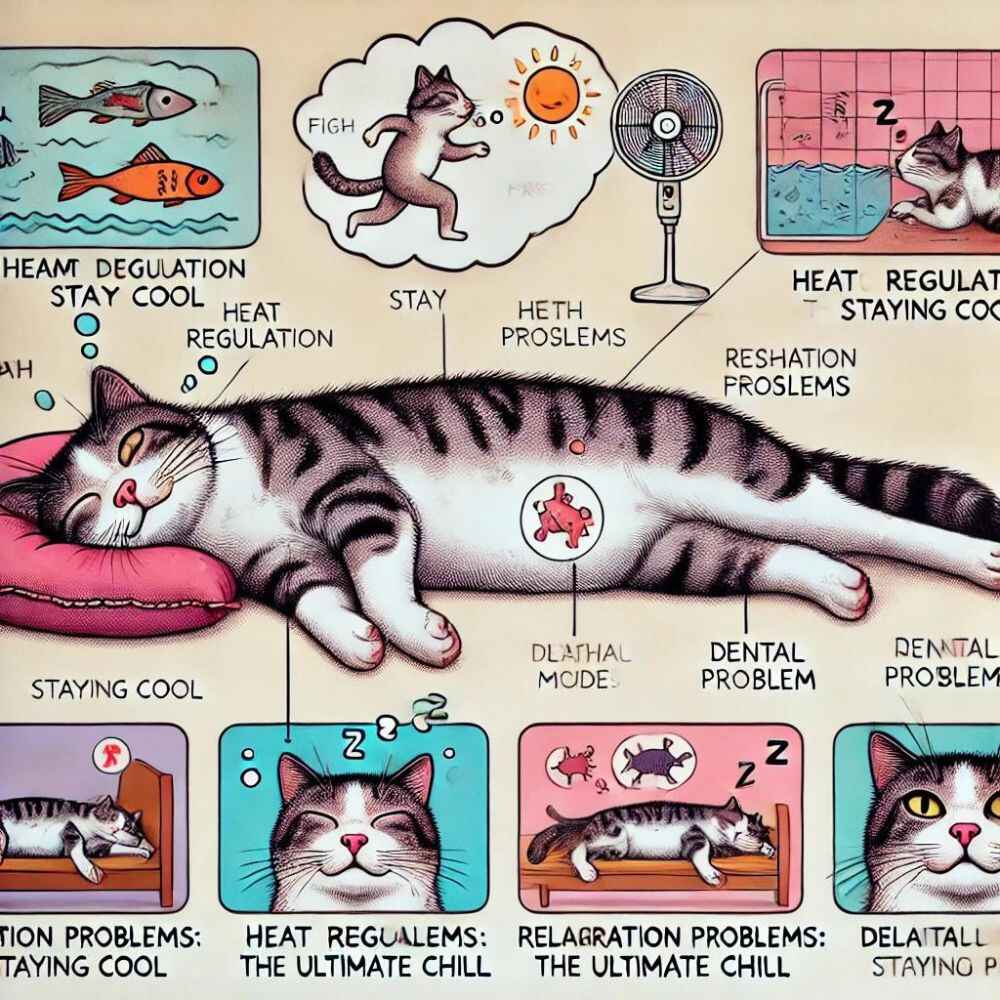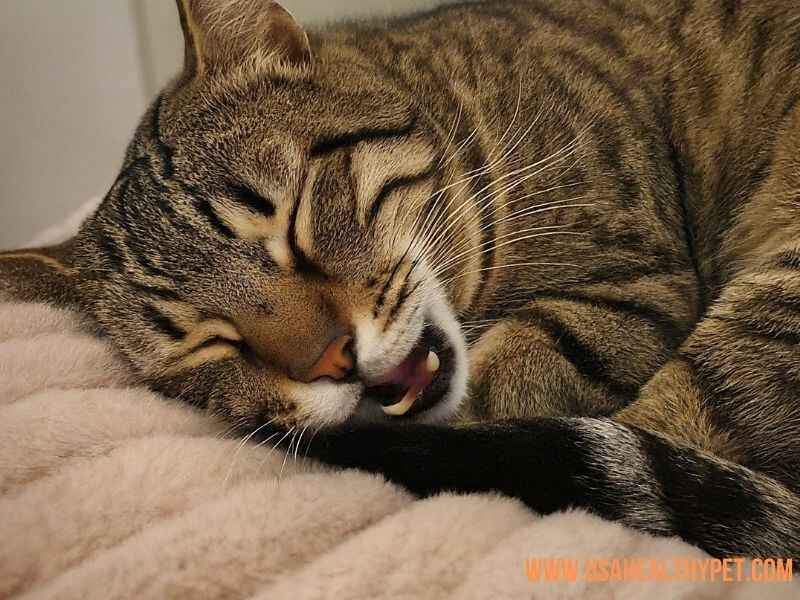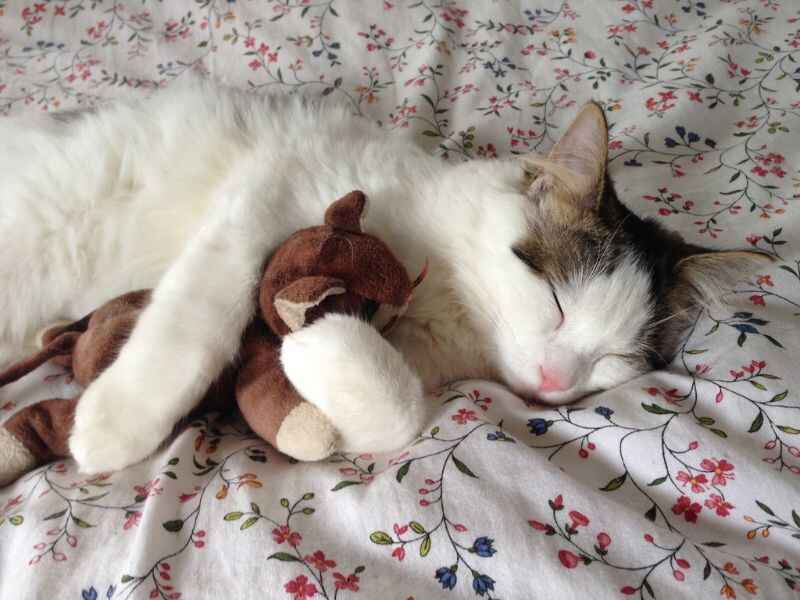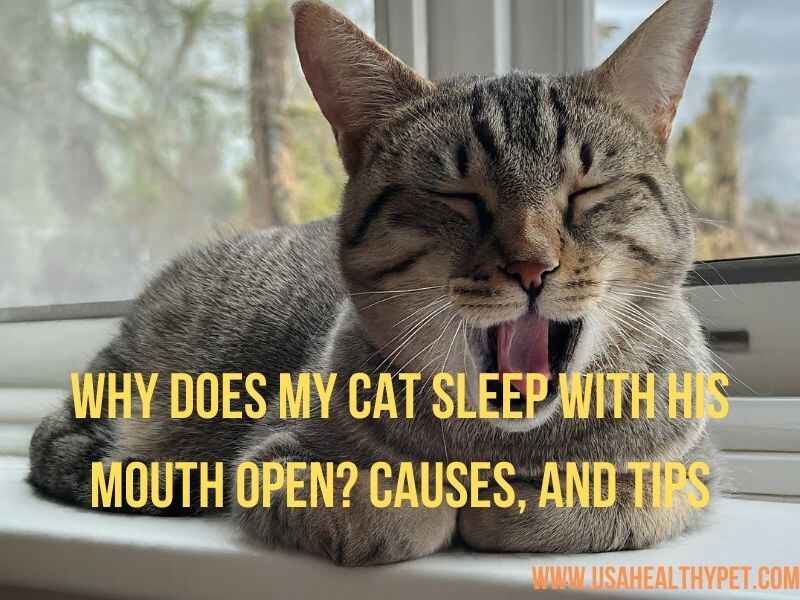Cats have a way of surprising us with their weird yet adorable behaviors. One of these could be finding your cat asleep with his mouth wide open.
Ever wondered why your kitten sometimes sleeps with her mouth open? Is it normal behavior, or could it be a sign of something more serious?
Let’s explore this quirky cat behavior and find out if you need to be concerned.
Key Points:
Normal Behavior:
- Cats may sleep with their mouths open due to deep relaxation, dreaming, or regulating body temperature.
- Flat-faced breeds like Persians are more prone to this due to their facial structure.
Signs of Potential Issues:
- Mouth breathing, frequent open-mouth sleeping, or additional symptoms like coughing, wheezing, or drooling may indicate respiratory, dental, or heart issues.
When to Be Concerned:
- Look for warning signs such as labored breathing, lethargy, excessive drooling, or blue gums.
- Immediate veterinary attention is recommended if your cat struggles to breathe.
Home Remedies and Tips:
- Improve air quality, maintain dental hygiene, and provide a cool, stress-free environment.
- Observe changes in your cat’s behavior and sleeping patterns.
Consult a Vet:
- If you’re unsure or notice any alarming symptoms, consult your veterinarian to rule out serious health conditions.
Understanding Normal Cat Behavior
Cats and Their Unique Sleep Habits
To understand why your cat sleeps with his mouth open, we first need to get a grip on their general sleep habits. Cats sleep a lot—like, a lot a lot.
Most cats snooze between 12 to 16 hours a day. And their sleep can range from deep, restful slumber to light, alert naps where they’re ready to pounce at the slightest sound.
When Sleeping with an Open Mouth is Normal
Let’s get one thing straight—sometimes, it’s completely normal for a cat to sleep with its mouth open. Here are a few common reasons why:
Dreaming: Yes, Cats Do That Too!
Did you know cats dream just like humans? It’s true! Just like us, cats go through different sleep stages, including REM (Rapid Eye Movement) sleep, where most dreaming occurs.
During this phase, their muscles may relax completely, causing their mouths to drop open. It’s like they’re in a deep dream state, chasing imaginary mice or playing with phantom balls of yarn.
Heat Regulation: Staying Cool
Cats don’t sweat like we do. Instead, they might pant or open their mouths to regulate their body temperature.
Dr. Emily Parker, a feline health expert, explains, “Flat-faced breeds, like Persians, may sleep with their mouths open more often due to their facial structure, which makes breathing a bit harder, especially in hot weather.”

Relaxation Mode: The Ultimate Chill
Ever felt so relaxed that your jaw literally dropped? Well, the same can happen to cats. When they’re in a deep state of relaxation, their muscles—including those around their jaw—can completely loosen.
This relaxed state can lead to an open-mouth snooze, especially in older cats or those with dental issues.
When You Should Be Concerned
While there are many reasons for a cat to sleep with its mouth open, there are also situations where this could indicate a problem.
A study by the American Veterinary Medical Association found that around 20% of cats that display open-mouth breathing may have underlying health problems, particularly if they also exhibit other symptoms like coughing or lethargy.
Respiratory Problems: Breathing Issues
If your cat’s mouth is open due to labored breathing, that’s a red flag. Respiratory problems like asthma, infections, or blockages can make it difficult for your cat to breathe through its nose, leading it to breathe through its mouth.
If your cat is struggling to breathe with its mouth open, it’s crucial to seek veterinary attention immediately,” advises Dr. Sarah Wooten, DVM, a well-known veterinarian.
Dental Issues: Toothache or Gum Problems
Dental problems are another common cause. An infected tooth, gum disease, or any kind of oral discomfort could cause your cat to hold its mouth open to alleviate pain.
Look for other signs like drooling, bad breath, or difficulty eating—these could all point to a dental issue.

Heart Conditions: A Possible Red Flag
Though less common, certain heart conditions can cause a cat to sleep with its mouth open. Congestive heart failure or fluid buildup around the lungs can make breathing challenging, even during sleep.
If your cat also shows signs like coughing, lethargy, or a decreased appetite, it’s time for a vet visit.
Signs It’s Time to See a Vet
Wondering when you should worry? Here are some signs that warrant a trip to the vet:
- Rapid or labored breathing
- Coughing or wheezing
- Excessive drooling
- Noticeable discomfort or pain
- Blue or pale gums
- Weight loss or loss of appetite
How to Observe Your Cat’s Behavior
Here’s a handy table to help you observe your cat’s behavior and decide when it’s time to see a vet:
| Behavior | Possible Cause | Action Needed |
|---|---|---|
| Occasional mouth opening during sleep | Dreaming, Relaxation, Heat Regulation | Normal, monitor occasionally |
| Frequent mouth breathing or panting | Respiratory Issues, Overheating | Ensure a cool environment, monitor |
| Mouth open with drooling or bad breath | Dental Problems | Check for dental issues, consult a vet |
| Mouth open with coughing or wheezing | Heart Conditions, Respiratory Problems | Urgent vet visit required |
Home Remedies and First Aid
If you’ve noticed your cat sleeping with its mouth open and there aren’t any immediate red flags, you can take a few steps at home to ensure your feline friend stays comfortable.
Improving Air Quality at Home
Ensure your home is well-ventilated, especially if you live in a humid or hot climate.
Using air purifiers or fans can help reduce allergens and improve air quality, which could make breathing easier for your cat.

Dental Hygiene for Cats
Just like us, cats need regular dental care. Consider brushing your cat’s teeth with a pet-friendly toothbrush or providing dental treats that help maintain oral hygiene.
This can prevent dental issues that may cause discomfort or pain.
Keeping Your Cat Comfortable
Make sure your cat has access to a cool, quiet place to rest, especially during hot weather. You might also want to provide a soft bed or blanket to help them feel secure and comfortable.
The Role of Stress and Anxiety
Believe it or not, stress and anxiety can also cause your cat to keep its mouth open while sleeping. Cats are sensitive creatures and can easily get stressed by environmental changes, such as a new pet or a house move.
Keeping a consistent routine and providing plenty of mental and physical stimulation can help reduce anxiety.
Conclusion: What Should You Do Next?
So, why does your cat sleep with its mouth open? It could be something as harmless as a dream or a method to cool down, but it might also indicate a more serious health issue.
Keep an eye on your cat’s behavior and look for any warning signs. If in doubt, always consult your vet to ensure your furry friend stays healthy and happy.
Frequently Asked Questions (FAQs)
- Is it normal for cats to sleep with their mouths open?
- Yes, it can be normal, especially if it happens occasionally or when your cat is in a deep state of relaxation or dreaming.
- Could an open mouth while sleeping mean my cat is sick?
- It could. Respiratory issues, dental problems, and heart conditions are all possible reasons. If you notice other symptoms, consult your vet.
- What should I do if my cat is breathing through its mouth?
- Monitor your cat for signs of distress. If mouth breathing persists or is accompanied by other symptoms like coughing or lethargy, contact your vet.
- How can I improve my cat’s dental health?
- Regular brushing with a cat-friendly toothbrush, dental treats, and check-ups with your vet can help maintain good oral health.
- Can anxiety cause my cat to sleep with its mouth open?
- Yes, stress or anxiety can lead to unusual behavior, including sleeping with the mouth open. Providing a calm and comfortable environment can help.

Pingback: Do Cats Like Belly Rubs? Understanding Feline Behavior
Pingback: Why Does My Cat Sniff My Eyes? Understanding Feline Behavior